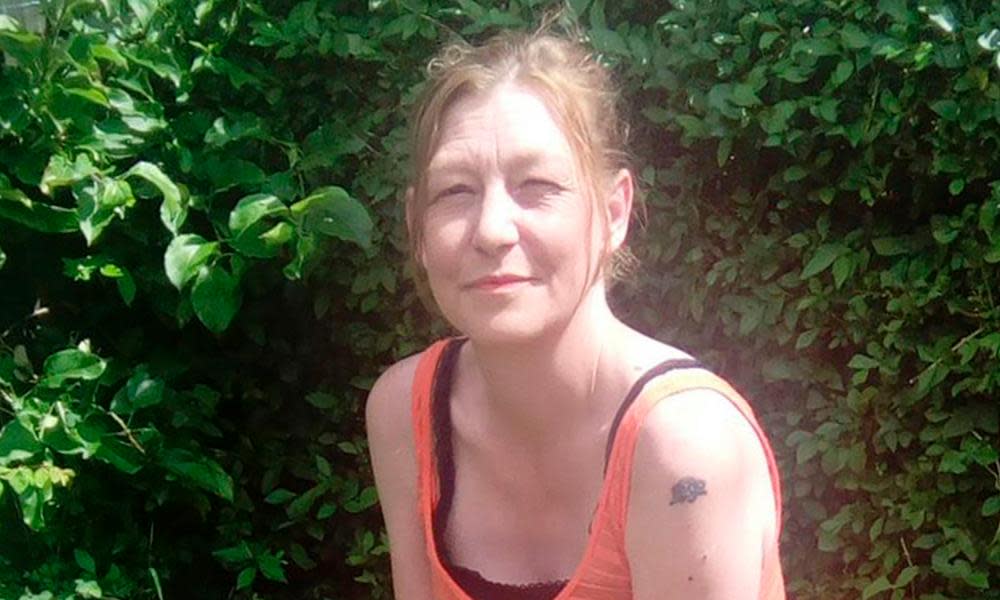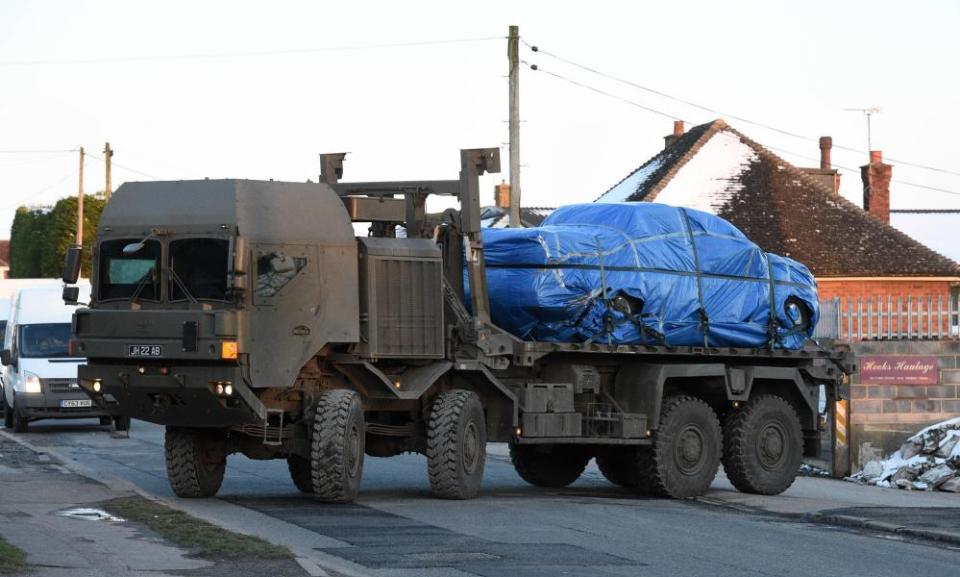Novichok in Wiltshire death 'highly likely' from batch used on Skripals

The British woman killed by a Russian military nerve agent suffered a huge dose after handling a container contaminated by novichok, believed to be from the same batch used in March’s attempted assassination of Sergei and Yulia Skripal, police have said.
The Metropolitan police assistant commissioner Neil Basu said the substance that led to Dawn Sturgess and her partner Charlie Rowley falling ill on 30 June in Amesbury, Wiltshire was in a vessel or container when the couple came across it.
Police have opened a murder investigation after Sturgess died in hospital on Sunday at 8.26pm.
On Monday, Basu said Sturgess and Rowley got a high dose of novichok after handling a container containing the nerve agent. It was most likely that the container police are hunting for was linked to the attack on the Skripals four months earlier.
He said detectives would need forensic evidence before definitively saying the novichok used in the first attack had made the British couple ill.
Basu said of his detectives: “They are unable to say at this moment whether or not the nerve agent found in this incident is linked to the attack in March on Sergei and Yulia Skripal. However, this remains our main line of inquiry.
“In the four months since the Skripals and Nick Bailey were poisoned, no other people besides Dawn and Charlie have presented with symptoms. Their reaction is so severe it resulted in Dawn’s death and Charlie being critically ill. This means they must have got a high dose. Our hypothesis is they must have handled the container we are now seeking.”
Several sites have been cordoned off; the three of most interest are Queen Elizabeth Gardens in Salisbury, where the British couple spent part of Friday; the Salisbury homeless hostel where Sturgess lived and both visited on Friday; and Rowley’s Amesbury home, which they also visited on Friday.
In addition to Sturgess and Rowley, 21 people have been examined by health experts over concerns they could have been exposed to novichok – eight police officers and staff, nine healthcare workers, one paramedic and three members of the public. Wiltshire police said all had been assessed, screened and discharged.
Kier Pritchard, the chief constable of Wiltshire, said: “There is nobody with any ongoing health concerns.”
Asked what the ramifcations were if the object the pair handled was not found, Pritchard said: “It’s a real concern for as all. I fully understand the concerns. It’s unprecedented.” He said he accepted that some people might feel the police had failed to keep the public safe following the Skripal attack.
On Monday afternoon, a road was cordoned off on the edge of Salisbury city centre after a man in his sixties was taken ill. Police, paramedics and firefighters attended amid concerns that it could have been another poisoning but the all-clear was given after several hours.
Some people also expressed concern that a bus Sturgess and Rowley caught from Salisbury to Amesbury on Friday evening – a few hours before they collapsed – was only seized on Wednesday. It was taken to Porton Down and no traces of nerve agent were found on board.
The home secretary, Sajid Javid, chaired a meeting of the government’s Cobra emergency committee on Monday.
Later, he told MPs in the Commons that Porton Down scientists had been able to recover novichok from only the blood of Sturgess and Rowley. It was too small an amount to examine to see if it was from the same batch used in the March attack, making it more important that investigators hunt down the item that contaminated the British couple.
The decision by Basu, who heads Scotland Yard’s counter-terrorism command, to link the two attacks on Monday increases the pressure on Russia.
Britain has blamed Moscow for the attack on the Skripals. Sturgess died in hospital on Sunday and Rowley remains critically ill.
The defence secretary, Gavin Williamson, directly accused Moscow on Monday. He told the Commons: “The simple reality is that Russia has committed an attack on British soil which has seen the death of a British citizen. That is something that I think the world will unite with us in actually condemning.”
A relative at Sturgess’s family home in Durrington, near Amesbury, said the family was “devastated” but declined to comment further.
Service personnel wearing protective gloves and breathing apparatus towed a red van away from a road in Durrington on Sunday night. Police officers had stood guard near the van in Avondown Road during the day, neighbours said.
The road was cordoned off and members of the RAF Regiment arrived in protective gear. They wrapped the van in plastic, loaded it on to a military lorry and drove it away for tests at Porton Down.

The road is close to where Sturgess’s parents live and two miles from Amesbury. Neighbours said they did not know who owned the van.
There is growing unease among some people in Salisbury and Amesbury that they are not being given enough information.
Ricky Rogers, a Wiltshire councillor and the leader of the Labour group on Wiltshire council, said the death of Sturgess had “heightened tension”.
“Local residents have never been told enough about the first incident back in March. I think someone from counter-terrorism needs to come here and tell us what they know,” he said.

 Yahoo News
Yahoo News 
